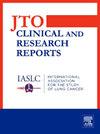Midkine表达作为预测IA期肺腺癌复发的候选生物标志物
IF 3.5
Q2 ONCOLOGY
引用次数: 0
摘要
背景:严重复发限制了IA期肺腺癌(LUAD)术后患者的长期生存。本研究旨在通过Midkine (MDK)的表达对术后IA期LUAD进行风险分层。材料与方法我们收集了62例IA期LUAD患者的手术标本,其中30例早期复发,其余无复发。免疫组织化学染色检测肿瘤内和肿瘤周围MDK的表达。我们还分析了来自癌症基因组图谱(TCGA)和基因表达综合库的IA期LUAD的MDK表达。结果肿瘤内MDK在早期复发患者中显著过表达(p <;0.001)。Kaplan-Meier生存分析显示,肿瘤内MDK表达较高的患者无复发生存期较差(p <;0.001)和总生存率(p = 0.004)。单因素Cox回归分析显示,瘤内MDK表达显著增加复发风险(危险比[HR] 1.408 (1.076 ~ 1.842), p = 0.013)和死亡风险(危险比[HR] 1.888 [1.127 ~ 3.162], p = 0.016)。逐步Cox回归分析显示,吸烟(HR 2.944 [1.419-6.107], p = 0.004)、瘤内MDK表达(HR 1.316 [1.037-1.669], p = 0.024)、EGFR突变(HR 2.407 [1.110-5.221], p = 0.026)是早期复发的独立预后因素。在TCGA数据集中,MDK表达显著增加复发风险(HR 1.559 [1.035-2.349], p = 0.034), MDK表达较高的患者无病生存期较差(p = 0.024)。在GSE31210中,MDK表达显著增加复发风险(HR 2.617 [1.791-3.824], p <;0.001)和死亡(HR 2.495 [1.429-4.356], p = 0.001),而MDK表达较高的患者无复发生存期(p = 0.006)和总生存期(p <;0.001)。结论mdk可作为预测IA期LUAD患者早期复发的候选指标。本文章由计算机程序翻译,如有差异,请以英文原文为准。
Midkine Expression as a Candidate Biomarker to Predict the Recurrence of Stage IA Lung Adenocarcinoma
Background
Early recurrence limits the long-term survival of postoperative patients with stage IA lung adenocarcinoma (LUAD). This study aims to risk-stratify postoperative stage IA LUAD by means of the expression of Midkine (MDK).
Materials and Methods
We collected surgical samples from 62 patients with stage IA LUAD, of which 30 patients had early recurrence and others without. Intratumoral and peritumoral MDK expression were measured by immunohistochemistry staining. We also analyzed the MDK expression of stage IA LUAD from The Cancer Genome Atlas (TCGA) and Gene Expression Omnibus repository.
Results
The intratumoral MDK was significantly overexpressed in patients with early recurrence (p < 0.001). Kaplan-Meier survival analysis revealed that patients with higher intratumoral MDK expression had poor recurrence-free survival (p < 0.001) and overall survival (p = 0.004). Univariate Cox regression analysis indicated that intratumoral MDK expression significantly increased the risk of recurrence (hazard ratio [HR] 1.408 (1.076–1.842), p = 0.013) and death (HR 1.888 [1.127–3.162], p = 0.016). Stepwise Cox regression analysis revealed that smoking (HR 2.944 [1.419–6.107], p = 0.004), intratumoral MDK expression (HR 1.316 [1.037–1.669], p = 0.024), and EGFR mutation (HR 2.407 [1.110–5.221], p = 0.026) were independent prognostic factors for early recurrence. In TCGA data set, the MDK expression significantly increased the risk of recurrence (HR 1.559 [1.035–2.349], p = 0.034), and patients with higher MDK expression had worse disease-free survival (p = 0.024). In GSE31210, the MDK expression significantly increased the risk of recurrence (HR 2.617 [1.791–3.824], p < 0.001) and death (HR 2.495 [1.429–4.356], p = 0.001), whereas patients with higher MDK expression also had worse recurrence-free survival (p = 0.006) and overall survival (p < 0.001).
Conclusion
MDK was considered a putative candidate for predicting early recurrence in patients with stage IA LUAD.
求助全文
通过发布文献求助,成功后即可免费获取论文全文。
去求助
来源期刊

JTO Clinical and Research Reports
Medicine-Oncology
CiteScore
4.20
自引率
0.00%
发文量
145
审稿时长
19 weeks
 求助内容:
求助内容: 应助结果提醒方式:
应助结果提醒方式:


